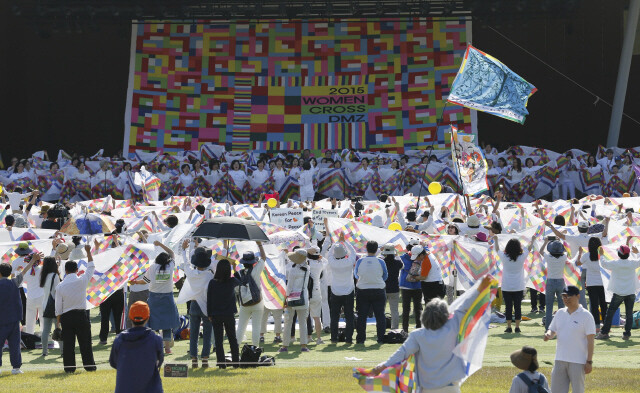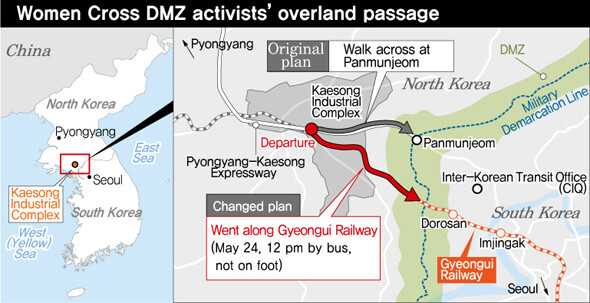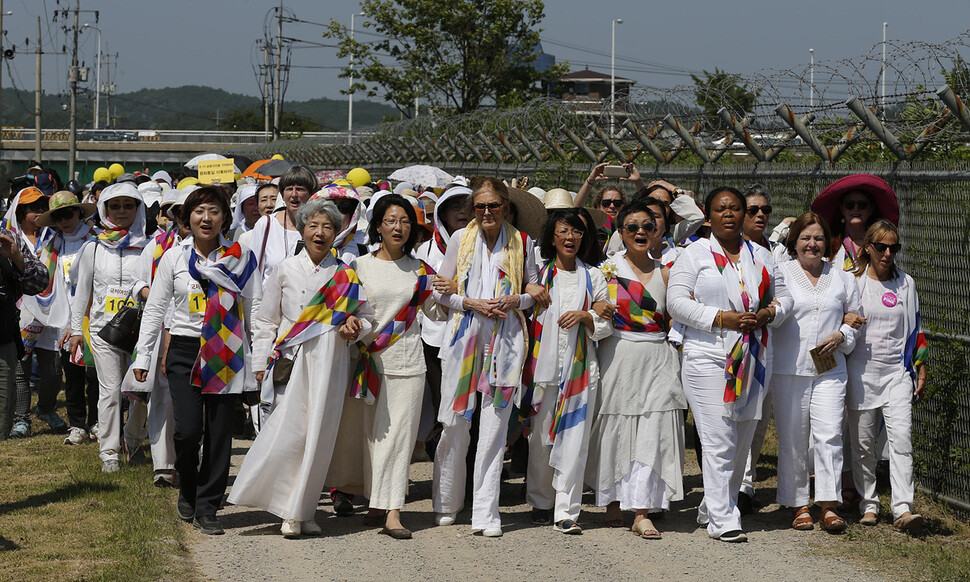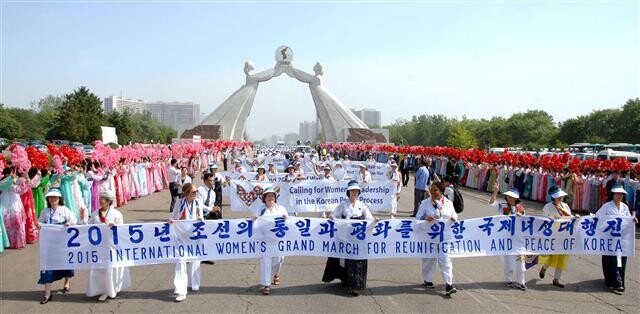hankyoreh
Links to other country sites 다른 나라 사이트 링크
Delegation of women activists from abroad cross the DMZ in the name of peace

In the name of peace and women everywhere, they crossed the armistice line.
WomenCrossDMZ, a group of 30 female peace activists from 15 countries, arrived on South Korean soil over the Demilitarized Zone at around noon on May 24 over the Gyeongui Line land route.
The original schedule had the group crossing on foot at Panmunjeom, but was altered to a bus crossing over the Gyeongui Line after the South Korean government objected. But with civilians from around the world sending a message of peace with their crossing of a longstanding symbol of inter-Korean division, the journey could help thaw inter-Korean relations, which have turned frostier in recent weeks with the cancelation of a North Korea visit by UN Secretary-General Ban Ki-moon and conflicts over the sharing of intelligence reports about Minister of the People’s Armed Forces Hyon Yong-chol’s alleged execution.

The group’s honorary co-chair, US women’s rights advocate Gloria Steinem, said at a press conference that women from 15 countries had created a point of connection between the two countries of North and South Korea.
“We weren’t sure we could do it, but we feel proud to have made this peaceful journey for the sake of dialogue, peace, and women’s human rights,” said Steinem, 81, at the press conference at the Dorasan Immigration Office in Paju, Gyeonggi Province, after completing the crossing.
Mairead Maguire, a 71-year-old from Northern Ireland who won the Nobel Peace Prize in 1976, said the saddest sight she encountered in North Korea was the divided families.
“These brothers and sisters who couldn’t see other again because of the unending Cold War,” Maguire said.
“I hope North and South Korea can have peaceful dialogue about the shared humanity and brotherly and sisterly love even in the lingering Cold War system. Peace is possible,” she continued.
Leemah Gbowee, a 44-year-old Liberian and winner of the 2011 Nobel Peace Prize, said the journey had “created a new path of communication between North and South through civilian-to-civilian diplomacy.”
“What I came to believe during the Liberian civil war was that small steps can change the world,” she added.
Maguire also responded to critics’ claims that the women focused too much on cooperation from North Korean authorities while ignoring North Korea’s poor human rights record.
“Human rights can only be guaranteed under normal conditions,” she said. “North Korea is still at war under unending economic sanctions, which is a political situation that makes human rights difficult to guarantee.”
After the press conference, the group announced a 2015 declaration for peace and unification on the Korean Peninsula at the 2015 Women’s Peace Walk Festival at Pyeonghwa-Nuri Park at Imjingak Pavilion. The declaration called for replacing the current armistice agreement with a peace treaty, helping reunite divided families, withdrawing sanctions that harm innocent civilians, banning wartime violence against women and gifts and achieving justice for the comfort women drafted as sex slaves during World War II, and enlisting support from around the world in achieving reconciliation and unification on the Korean Peninsula as a cornerstone for future global peace.

The original plan for WomenCrossDMZ was to have participants arrive in South Korea on foot at Panmunjeom after crossing the DMZ from the North. They ultimately opted to arrive by bus over the Gyeongui Line rather than Panmunjeom after South Korean authorities refused their approval.
No one has attempted to cross on foot since then-South Korean President Roh Moo-hyun walked over the Gyeongui Line during an Oct. 2007 visit to North Korea for an inter-Korean summit. Five New Zealanders crossed the DMZ by motorcycle in 2013, and 32 ethnic Koreans from the former Soviet Union drove over in 2014 to commemorate the 150th anniversary of a mass Korean migration to Russia, but none attempted to walk across.
After arriving in South Korea, Peace Walk participants and 300 South Korean women began the 2.5-kilometer walk to Pyeonghwa-Nuri Park at 2 pm, traveling on the Pyeonghwa-Nuri Road following the barbed wire fence along the Imjin River from the northern end of the Unification Bridge. While many, like Steinem, were women’s right activists in their seventies and eighties, the marchers held hands and sang the songs “Arirang” and “Women Lead” as they walked through dust clouds under broiling heat. During a welcome ceremony and celebratory performance at Pyeonghwa-Nuri Park, a four-by-four meter “peace patchwork” was unveiled, with squares contributed by women from South and North and ethnically Korean women from overseas.
Around ten members of conservative groups followed the group from the northern end of the Unification Bridge and shouted at the marchers, but were blocked by police from approaching the Peace Walk participants.
“Get out and go to North Korea, hypocrites,” showed members of groups such as the National Alliance for Sending Leaflets to North Korea and the Moms’ Unit.
Amid the continued protests, participants canceled their original plans to attend an afternoon ceremony for the “Goyang International Women’s Peace Declaration” announcement at Ilsan Lake Park in Goyang for safety reasons.
The idea for the Peace Walk was first conceived in 2009 by Christine Ahn, the Korean-American co-founder of the National Campaign to End the Korean War. Participants held a press conference at the UN headquarters in New York in March to officially announce the event. After assembling in Beijing on May 17, they traveled on to Pyongyang on May 19.

During their six days in North Korea, participants visited Kim Il-sung’s birthplace of Mangyongdae and Kyongsang Kindergarten in Pyongyang on May 20 before staging an International Women’s Symposium with North Korean women on May 21.
On the morning of May 24, they began their walk with North Korean women from the Three Charters for National Reunification Monument in Pyongyang. After holding a peace ceremony at Panmunjeom, they boarded a bus in Kaesong from the trip south.
“The thing we did most often with our North Korean interpreters over our five days together was laugh,” said Steinem. “You could fear each other if you’ve been divided for so long, but we need to love.”
Event participants officially disputed pro-North Korea remarks attributed to them in North Korea’s Rodong Sinmun newspaper.
“We never said those things, and we have made a complaint to the North about them,” they said.
On May 21, the newspaper quoted Ahn as saying the “Great Leader [Kim Il-sung] gave everything for the freedom and liberation of the people.”
“Christine absolutely did not make those remarks,” Steinem said at the press conference on May 24.
The Peace Walk participants plan to attend an international women’s peace conference at Seoul City Hall on May 25 before returning home on May 26.
By Hong Yong-deok, south Gyeonggi correspondent and Kim Ji-hoon, staff reporter, in Paju
Please direct questions or comments to [english@hani.co.kr]

Editorial・opinion
![[Guest essay] The real reason Korea’s new right wants to dub Rhee a founding father [Guest essay] The real reason Korea’s new right wants to dub Rhee a founding father](https://flexible.img.hani.co.kr/flexible/normal/500/300/imgdb/original/2024/0423/8317138574257878.jpg) [Guest essay] The real reason Korea’s new right wants to dub Rhee a founding father
[Guest essay] The real reason Korea’s new right wants to dub Rhee a founding father![[Column] ‘Choson’: Is it time we start referring to N. Korea in its own terms? [Column] ‘Choson’: Is it time we start referring to N. Korea in its own terms?](https://flexible.img.hani.co.kr/flexible/normal/500/300/imgdb/original/2024/0423/3617138579390322.jpg) [Column] ‘Choson’: Is it time we start referring to N. Korea in its own terms?
[Column] ‘Choson’: Is it time we start referring to N. Korea in its own terms?- [Editorial] Japan’s rewriting of history with Korea has gone too far
- [Column] The president’s questionable capacity for dialogue
- [Column] Are chaebol firms just pizza pies for families to divvy up as they please?
- [Column] Has Korea, too, crossed the Rubicon on China?
- [Correspondent’s column] In Japan’s alliance with US, echoes of its past alliances with UK
- [Editorial] Does Yoon think the Korean public is wrong?
- [Editorial] As it bolsters its alliance with US, Japan must be accountable for past
- [Guest essay] Amending the Constitution is Yoon’s key to leaving office in public’s good graces
Most viewed articles
- 1[Guest essay] The real reason Korea’s new right wants to dub Rhee a founding father
- 2[Column] ‘Choson’: Is it time we start referring to N. Korea in its own terms?
- 3Why Korea shouldn’t welcome Japan’s newly beefed up defense cooperation with US
- 4Senior doctors cut hours, prepare to resign as government refuses to scrap medical reform plan
- 5Terry Anderson, AP reporter who informed world of massacre in Gwangju, dies at 76
- 6New AI-based translation tools make their way into everyday life in Korea
- 7[Column] The clock is ticking for Korea’s first lady
- 8Opposition calls Yoon’s chief of staff appointment a ‘slap in the face’
- 9[Column] The president’s questionable capacity for dialogue
- 10Korean government’s compromise plan for medical reform swiftly rejected by doctors